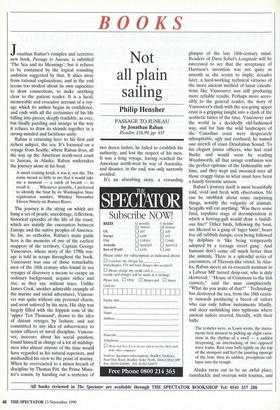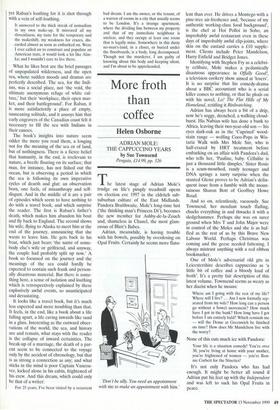BOOKS
Not all plain sailing
Philip Hensher
PASSAGE TO JUNEAU by Jonathan Raban Picador, £16.99, pp. 435
Jonathan Raban's complex and secretive new book, Passage to Juneau, is subtitled 'The Sea and its Meanings'; but it refuses to be contained by the logical sounding ambition suggested by that. It shies away from rational explanations, and in the end seems too modest about its own capacities to draw connections, to make anything clear to the patient reader. It is a lucid, memorable and evocative account of a voy- age which its author began in confidence, and ends with all the certainties of his life falling into pieces; deeply readable, as ever, but finally puzzling and strange in the way it refuses to draw its strands together in a strong-minded and factitious unity.
Raban is returning here to his first and richest subject, the sea. It's focussed on a voyage from Seattle, where Raban lives, all the way up the American north-west coast to Juneau, in Alaska. Raban undertakes the journey alone in his boat:
A smart cruising ketch, it was it, not she. The name meant so little to me that it would take me a moment — a catch of breath — to recall it.. . . Whenever possible, I preferred to identity the boat by its Washington State registration number, Whiskey November Eleven Ninety-six Romeo Bravo.
The journey is the string on which are hung a set of pearls; anecdotage, reflection, historical episodes of the life of the coast, which are mainly the encounters between Europe and the native peoples of America. So far, so orthodox. Raban's main guide here is the memoirs of one of the earliest mappers of the territory, Captain George Vancouver, whose story of the 1790s voy- age is told in scraps throughout the book. Vancouver was one of those remarkable men of the 18th century who found in sea voyages of discovery a means to escape an ordinary background, acquire riches and rise, as they say, without trace. Unlike James Cook, another admirable example of the marine and social adventurer, Vancou- ver was quite without any personal charm, and went unloved by his men. His ship was largely filled with the foppish sons of the 'upper Ten Thousand', drawn to the idea of distant voyages by fashion, and not committed to any idea of subservience to senior officers or naval discipline. Vancou- ver, insecure about his social position, found himself in charge of a lot of midship- men who almost anyone of the time would have regarded as his natural superiors, and mishandled his crew to the point of mutiny. When he overreacted to a minor breach of discipline by Thomas Pitt, the Prime Minis- ter's cousin, by handing out a sentence of two dozen lashes, he failed to establish his authority, and lost the respect of his men. It was a long voyage, having reached the American north-west by way of Australia, and disaster, in the end, was only narrowly avoided.
It's an absorbing story, a rewarding
glimpse of the late 18th-century mind. Readers of Dave Sobel's Longitude will be interested to see that the acceptance of Harrison's invention was not quite as smooth as she seems to imply; decades later, a hard-working technical virtuoso of the more ancient method of lunar calcula- tions like Vancouver was still producing more reliable results. Perhaps more acces- sibly to the general reader, the story of Vancouver's clash with the sea-going upper crust is a gripping insight into a clash of the aesthetic tastes of the time. Vancouver saw the world in a decidedly old-fashioned way, and for him the wild landscapes of the Canadian coast were desperately inhospitable, ugly and confused; he named one stretch of coast Desolation Sound. To his elegant junior officers, who had read Burke and would soon be reading Wordsworth, all that savage confusion was the perfect epitome of the fashionable sub- lime, and they wept and swooned over all those craggy vistas in what must have been a faintly tiresome unison.
Raban's journey itself is most beautifully told, vivid and fresh with observation. He can be snobbish about some surprising things, notably the vulgarity of animals. Seagulls will eat anything: 'Was there some final, repulsive stage of decomposition at which a herring-gull would draw a fastidi- ous line?' Other birds, following the boat, are likened to a gang of 'lager louts'; bears live off rubbish dumps; even being followed by dolphins is 'like being temporarily adopted by a teenage street gang'. And humans don't come off much better than the animals. There is a splendid series of encounters, of Theroux-like vitriol. In Alas- ka, Raban meets an ex-research assistant to a Labour MP turned drop-out, who is duly skewered: "House of Commons to the fish cannery," said the man complacently. "What do you make of that?" ' Technology has destroyed the sea, from the 18th centu- ry onwards producing a breed of sailors who can only follow instruments blindly, and steer unthinking into typhoons where ancient sailors steered, literally, with their balls:
The testicles were, as Lewis wrote, the instru- ments best attuned to picking up slight varia- tions in the rhythm of a swell — a sudden steepening, an interlocking of two opposed wave trains. Rest your balls lightly on the top of the stempost and feel the jaunting upsurge of the bow, then its sudden, precipitous col- lapse into the trough.
Alaska turns out to be an awful place, ramshackle and overrun with tourists, and
yet Raban's loathing for it is shot through with a vein of self-loathing.
It answered to the thick streak of nomadism in my own make-up. It mirrored all my slovenliness, my taste for the temporary and the makeshift, my weakness for crazes, dis- carded almost as soon as embarked on. Were I ever called on to construct and populate an American state, it would look a lot like Alas- ka; and I wouldn't care to live there.
What he likes best are the brief passages of unpopulated wilderness, and the open sea, whose sudden moods and dramas are perfectly described. The sea, for the Indi- ans, was a social place, not the void, the ultimate anonymous refuge of white cul- ture,' but their 'workplace, their open mar- ket, and their battleground'. For Raban, it is more satisfactorily a place of empty, unmeaning solitude, and it annoys him that early engravers of the Canadian coast felt it necessary to fill the sea with Indians in their canoes.
The book's insights into nature seem odder the more you read them, a longing not for the meaning of the sea or of land, but of nothingness. There is a fierce belief that humanity, in the end, is irrelevant to nature, a beetle floating on its surface; that man, for instance, has not fished out the ocean, but is observing a period in which the sea is following its own imperative cycles of dearth and glut: an observation born, one feels, of misanthropy and self- disgust. And in the middle of it are a pair of episodes which seem to have nothing to do with a travel book, and which surprise the reader. The first is Raban's father's death, which makes him abandon his boat and fly hack to England. The second shows his wife, flying to Alaska to meet him at the end of the journey, announcing that she wants to leave him. He gets back in his boat, which just bears 'the name of some- body else's wife or girlfriend, and anyway, the couple had probably split up now.' A book so focussed on the journey and the meanings of the sea could hardly be expected to contain such frank and person- ally disastrous material. But there is some- thing here, a sense of isolation and loathing which is retrospectively explained by these explosively awful events, so unanticipated and devastating.
It looks like a travel book, but it's much less expected and more troubling than that. It feels, in the end, like a book about a life falling apart, a life caving inwards like sand in a glass. Interesting as the outward obser- vations of the world, the sea, and history are and remain, what stays with the reader is the collapse of inward certainties. The break-up of a marriage, the death of a par- ent seem to be connected to the voyage only by the accident of chronology, but that is as strong a connection as any; and what sticks in the mind is poor Captain Vancou- ver, locked alone in his cabin, frightened of his crew. And this dream, which could only be that of a writer:
For 25 years, I've been visited by a recurrent bad dream. 1 am the owner, or the tenant, of a warren of rooms in a city that usually seems to be London. It's a strange apartment, where the dividing line between my property and that of my immediate neighbour is unclear, and they occupy at least one room that is legally mine. Somewhere in this dusty no-man's-land, in a closet, or buried under the floorboards, is a body, long decomposed. Though not the murderer, 1 am guilty of knowing about this body and keeping silent, and I'm about to be apprehended.



























































































 Previous page
Previous page